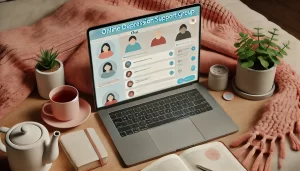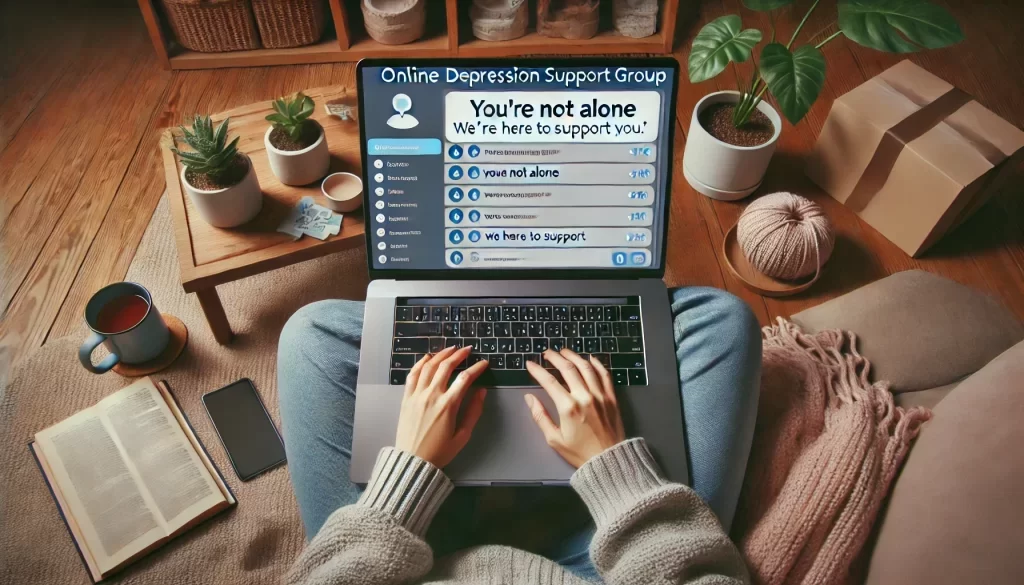Top-Rated Online Depression Support Communities You Can Access Now
Introduction
Managing depression can be challenging, but finding a supportive community can make a world of difference. Online support groups provide a safe, accessible space where individuals can connect, share their experiences, and receive encouragement from others facing similar struggles. In this guide, we’ve compiled the Top 10 Online Depression Support Groups You Can Join Today to help you find the right community for your needs. Whether you’re seeking peer support, professional guidance, or a combination of both, these online groups offer a valuable resource for anyone looking to overcome depression and feel less alone on their journey.
Community support plays a crucial role in managing depression by providing individuals with a sense of belonging, understanding, and emotional encouragement. Sharing experiences with others who face similar challenges reduces feelings of isolation and hopelessness. Support groups offer a safe space for expressing emotions, gaining insights, and fostering resilience through collective healing.
Online depression support groups offer accessibility by allowing individuals to connect from anywhere, at any time, removing barriers like location, cost, or transportation. These groups provide a sense of belonging by creating a safe, nonjudgmental space where people can share their struggles, gain support, and connect with others experiencing similar challenges.
1. The Benefits of Joining an Online Depression Support Group
Emotional support and shared experiences in online depression support groups allow individuals to connect with others who understand their struggles. By sharing personal stories, challenges, and successes, members can gain comfort and validation, reducing feelings of isolation. This sense of community fosters empathy, encouragement, and hope, offering relief in difficult times.
Anonymity and privacy in online spaces allow individuals to share their thoughts and experiences without fear of judgment or exposure. This can be especially important for those struggling with depression who may feel vulnerable or hesitant to seek support in person. Online platforms often offer features like pseudonyms and private messaging to protect users’ identities, fostering a sense of safety and comfort.
One of the key benefits of online depression support groups is their accessibility from anywhere at any time. Unlike in-person groups, these online communities are available 24/7, allowing individuals to seek support whenever they need it, regardless of their location. This flexibility makes it easier to connect with others and access resources, even during late nights or challenging moments.
Joining an online depression support group can significantly reduce feelings of isolation by providing a sense of belonging and connection with others who share similar experiences. Engaging in conversations with people who understand your struggles helps foster a supportive community, reminding you that you’re not alone in facing depression.
Professional and peer-led options refer to the different types of online support groups available. Professional-led groups are moderated by licensed therapists or mental health experts, providing guidance and evidence-based strategies. Peer-led groups, on the other hand, are run by individuals with lived experiences, offering relatable, empathetic support from those who understand firsthand.

2. What to Look for in a Quality Online Depression Support Group
Moderation by mental health professionals or experienced peers ensures that online support groups are safe, respectful, and productive environments. Professionals can provide accurate information, guide discussions, and address harmful behavior, while experienced peers offer empathy and firsthand understanding. This balance helps maintain a supportive atmosphere where members feel heard and validated.
A safe and supportive environment in online depression support groups ensures that members can share openly without fear of judgment or harassment. Clear guidelines help maintain respectful communication and protect vulnerable individuals. These rules typically cover appropriate behavior, confidentiality, and boundaries, ensuring the group remains a positive, inclusive space for healing.
Active community participation in online support groups is essential for creating a vibrant, supportive environment. It involves regular engagement from members who share experiences, offer advice, and provide emotional support. This consistent interaction fosters a sense of belonging, helps reduce isolation, and ensures that everyone feels heard and valued in the group.
When choosing an online depression support group, it’s important to consider whether the platform offers free or affordable access. Many support groups provide free membership or low-cost options, ensuring that financial barriers don’t prevent people from accessing the help they need. This makes mental health support more inclusive and accessible for everyone.
Online depression support groups often cater to diverse needs, offering specialized spaces for different populations. Some groups focus on teens dealing with school-related stress, while others are tailored for adults managing work-life balance or caregivers supporting loved ones with mental health challenges. These specific groups provide targeted support, fostering more meaningful connections.
3. Top 10 Online Depression Support Groups
- 1. 7 Cups
- 7 Cups offers a variety of features, including chat-based communication for real-time conversations, anonymous peer support to maintain privacy, and access to licensed therapists for those seeking professional mental health guidance.
- Many online depression support groups offer free access, while others provide premium membership options for additional resources. Most platforms are accessible 24/7, allowing users to join from anywhere at any time.
- 2. The Tribe
- A peer-to-peer online support community offers a safe space where individuals experiencing depression can connect, share personal stories, and offer mutual support. These groups foster understanding, empathy, and encouragement from those facing similar challenges.
- The platform offers interactive tools like live chat rooms, discussion boards, and private messaging, allowing users to engage in real-time conversations, share resources, and build supportive connections within the community.
- 3. National Alliance on Mental Illness (NAMI)
- NAMI’s online support groups are facilitated by trained volunteers who provide guidance and ensure a safe, supportive environment. These groups offer peer-led discussions, allowing participants to share experiences and receive emotional support.
- Most online depression support groups provide resources such as mental health articles, coping strategies, and forums. To join, simply register on their website, create a profile, and start participating in discussions.
- 4. SupportGroups.com
- The depression support group section offers a dedicated space for users to connect, share experiences, and receive support. The platform provides an intuitive, user-friendly interface for easy navigation and community engagement.
- These online support groups offer easy accessibility from any device, diverse features such as chatrooms and forums, and cover a wide range of mental health topics, ensuring support for various emotional challenges.
- 5. DailyStrength
- DailyStrength offers a vast depression support community where users can connect, share experiences, and offer encouragement. The platform provides a user-friendly interface, making it easy to engage with others facing similar challenges.
- Sharing personal stories allows members to connect on a deeper level, fostering empathy and understanding. Engagement with fellow members creates a supportive environment, where individuals feel heard, valued, and less isolated.
- 6. Depression and Bipolar Support Alliance (DBSA)
- Online groups tailored for individuals dealing with depression and bipolar disorder provide a supportive environment to share experiences, receive guidance, and connect with others facing similar mental health challenges in a safe space.
- Professional moderation ensures that online depression support groups are safe, respectful, and well-guided. Moderators, often mental health professionals, offer expert advice, manage discussions, and provide access to additional mental health resources.
- 7. Reddit – r/depression
- An anonymous, peer-led group on a popular platform like Reddit allows users to share personal experiences and seek support without disclosing their identity, promoting a safe, nonjudgmental environment for open discussions and connection.
- While online forums like Reddit’s r/depression provide anonymous peer support and active communities, they may lack professional moderation, which can result in varying advice quality and less structured guidance for participants.
- 8. Inspire
- The platform provides comprehensive mental health support tailored for both individuals experiencing depression and their families, offering a safe space to share experiences, access resources, and receive encouragement from a compassionate community.
- A trusted platform with active depression support communities offers a safe, moderated space for users to connect, share experiences, and seek encouragement from others, fostering a supportive and positive environment for healing.
- 9. MySupportForums
- MySupportForums is a forum-based mental health community offering dedicated depression-specific groups where users can engage in discussions, share personal experiences, and receive emotional support from peers facing similar challenges.
- User experience in online depression support groups includes ease of navigation, active participation, and a welcoming environment. Available resources often include educational articles, mental health tools, moderated discussions, and peer support options.
- 10. The Mighty
- The Mighty’s mental health community offers a supportive space where individuals share personal stories, experiences, and advice, with a dedicated focus on depression. It fosters connection, understanding, and empowerment for those struggling.
- Sharing personal stories and experiences within a support group fosters a sense of connection and understanding, offering hope and encouragement to others by showing that they are not alone in their struggles.
4. How to Choose the Right Online Support Group for You

When choosing an online depression support group, it’s important to assess your personal needs. Consider whether you prefer peer support, where individuals share similar experiences, or professional moderation, which ensures guidance from mental health experts. Additionally, think about the group size—some people thrive in larger communities, while others prefer more intimate, smaller groups.
Active participation in a support group fosters deeper connections and a stronger sense of belonging. Engaging with others by sharing experiences, offering encouragement, and receiving feedback helps build mutual trust and support. Regular involvement promotes personal growth, emotional healing, and a more positive group dynamic, enhancing the overall effectiveness of the group.
When choosing a support group, it’s important to find one that aligns with your comfort level and schedule. Consider whether you prefer anonymous participation or open engagement, as well as the group’s size and moderation style. Also, ensure the group meets at times that fit into your routine for consistent participation.
5. Additional Resources for Managing Depression
In addition to joining support groups, recommended reading materials such as self-help books on depression, mindfulness, and cognitive behavioral therapy (CBT) can offer practical strategies for managing symptoms. Mental health apps like Headspace, Calm, and Moodpath provide tools for meditation, journaling, and tracking mood, helping to enhance emotional well-being daily.
Therapy and medication play crucial roles in managing depression, offering professional guidance and medical treatment to address underlying issues. While support groups provide emotional connection and shared experiences, they complement—rather than replace—therapy and medication. Together, these approaches create a well-rounded treatment plan that supports long-term mental health recovery.
For individuals experiencing severe depression, seeking professional help is crucial. While support groups can provide emotional comfort, professional treatment such as therapy or medication is often necessary to address underlying issues. Licensed therapists and doctors can offer personalized strategies and medical interventions that significantly improve mental health outcomes and overall well-being.
Conclusion
In conclusion, finding the right support can be a transformative step in managing depression. The Top 10 Online Depression Support Groups You Can Join Today offer a variety of safe, welcoming communities where individuals can connect, share experiences, and receive guidance. Whether you’re looking for peer-led groups, professional moderation, or a mix of both, these online platforms provide essential emotional support and practical resources. While online groups are invaluable, remember that seeking professional help is important for more severe depression. Explore these groups today to start building meaningful connections and support on your journey to better mental health.




